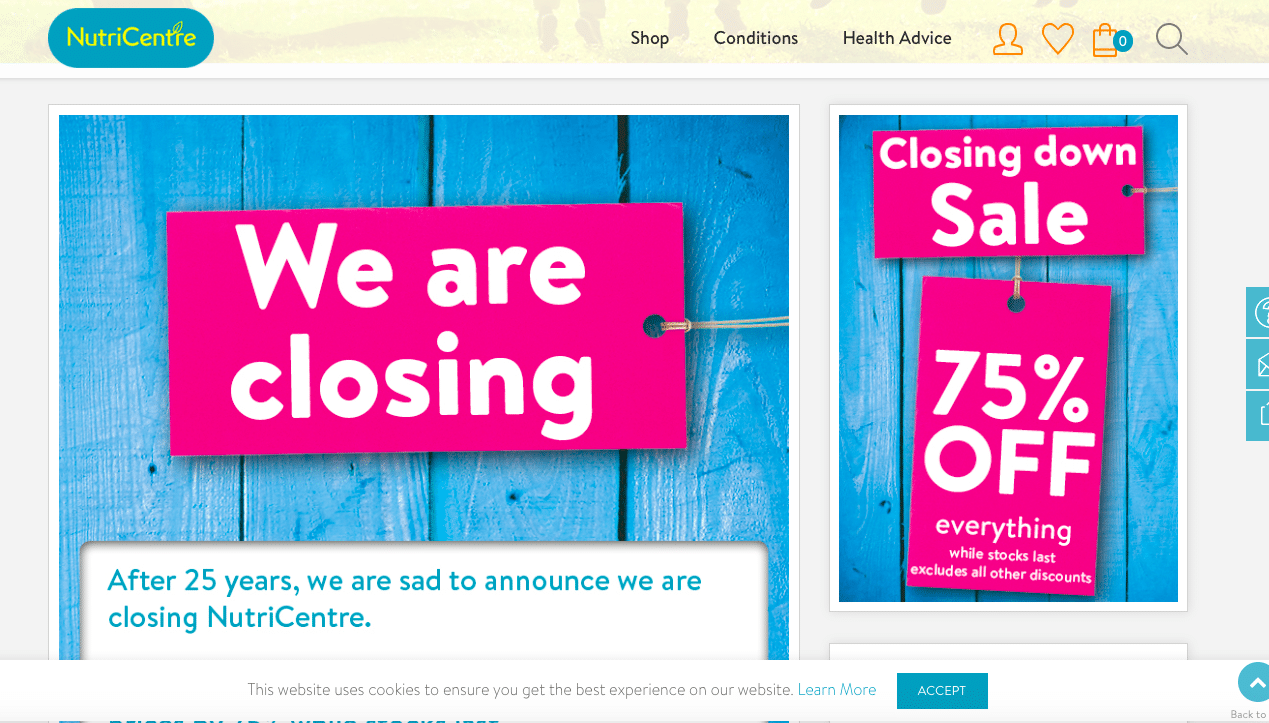Just weeks after announcing a major range re-set and unveiling a new management team at its NutriCentre business, Tesco says it is to close the operation.
A Tesco spokesperson said: “We have taken the difficult decision to close our Nutricentre business. We have learned a lot through Nutricentre but we believe we can serve our customers better through our core UK business. Our priority now is to support affected colleagues.”
We have learned a lot through Nutricentre but we believe we can serve our customers better through our core UK business”
The supermarket plans to close 12 NutriCentre stores and 11 concessions operating within Tesco stores. In December 2015 losses at the NutricCentre business were reported to have quadrupled from £2.2m to £8.3m on sales of £14 million (down from £16 million).
Around 140 staff are thought to be affected by the closure of the specialist health and wellbeing business.
Tesco bought a controlling stake in The Nutri Centre in 2001, then a specialist mail order and retailer owned by Rohit Mehta. The following year 85 Nutri Centre@Tesco products went on sale in 50 Tesco stores, while the full range of 22,000 health and wellbeing products continued to be available through mail order. In the same year Tesco opened a flagship NutriCentre store next to its West Kensington superstore, which would become the template for future outlets.
The retailer began rolling out further NutriCentre stand-alone units, before switching to the favoured store-within-a-store format. As well as creating a dedicated health and wellbeing destination, NutriCentre employed qualified nutritionists at each of its 23 main outlets further distinguishing it from other supermarket health offers.
In 2013 Tesco hired former Staples UK MD and senior Walmart executive, Amee Chande. Chande told NPN that she saw potential in the UK for “an entirely different scale of engagement” with the health and ‘self-care’ category. Tesco meanwhile hinted that it could eventually operate 200 NutriCentre outlets.
But the NutriCentre business had become beset with structural and distribution problems. This was admitted earlier this year when a newly installed management team announced fresh plans for the NutriCentre.
In a candid analysis of the NutriCentre business MD Jessica Frame – appointed in April after the departure of Chande – told journalists: “We know we’ve not been living up to our heritage, so we’re doing a big refocus. We know we’ve still not got it 100% right, but we’re open – and we’re super open to learning. But to be clear, we’ve had a huge amount of foundation to fix.”
“We know we’ve not been living up to our heritage. We know we’ve still not got it 100% right”
Frame also acknowledged that the business had had a serious problem with out of stocks, and needed to address regulatory compliance issues with a number of brands. Frame said that a six-month review of the business had led to NutriCentre slashing the number of products it carried from 27,000 to 6000.
Many specialist nutrition brands face the prospect of a significant loss of income from the closure of NutriCentre – those with current listings include Solgar, Pukka, Higher Nature, Biocare, Reflex Nutrition, Lamberts, Viridian, Nature’s Plus, Vega, Quest, Raw Health, Tiana, CherryActive, Biona and Comvita. One brand owner told NPN that Tesco’s withdrawal from specialist nutrition and retail would add to a “challenging climate” for brands.
But Viridian Nutrition founder, Cheryl Thallon, said Tesco’s “disaster” with NutriCentre sent a warning to other mass-market retailers to keep out for a market they didn’t understand. She commented: “The closure of the Nutricentre is the end of an era. The original founder Rohit Mehta was a trailblazer in the natural health movement and to witness Tesco’s failure to build on this iconic business is immensely disappointing.
“The original founder Rohit Mehta was a trailblazer in the natural health movement and to witness Tesco’s failure to build on this iconic business is immensely disappointing”
“For many years, the Nutricentre at Park Crescent was a flagship for our industry and lent gravitas to the emerging category of research-driven supplements. I feel especially distressed for the hundred plus staff who have lost their jobs, but feel confident that many of these highly qualified nutritionists will find new roles within local health stores. Tesco’s disaster reiterates my view that specialist health retailing is best left to the independent sector which is far better able to meet the needs of the consumer. Hopefully, this multi-million pound loss will send a loud message to the mass-market to keep their paws off.”
• We’d like to hear your reaction to Tesco’s decision to close NutriCentre. Why not leave a comment below or email us at [email protected]





